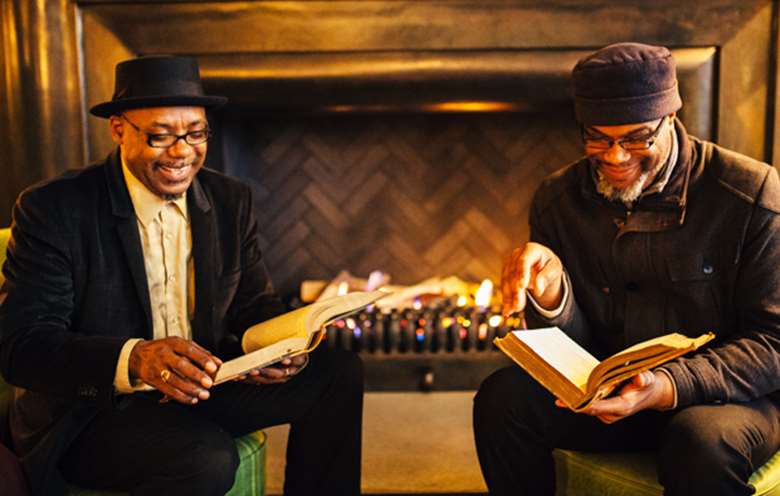Black Top bring the funk to Freedom: The Art Of Improvisation Festival
Wednesday, July 8, 2015
“Yes… central heating.

” These words from Cleveland Watkiss, closing Black Top’s set on the final day of the inaugural weekend event from Warriors International, effectively capture the spirit of what is known as word, sound and power among Rasta messengers. Indeed the vocalist’s appropriation of a prosaic term in Standard English makes a bigger point about the invention at the heart of so many West Indian cultural forms. This is not about the function of British Gas. Watkiss is subverting language just as Jamaican audiences might roar ‘Forward!’ instead of ‘More’ at the end of a gig that they don’t want to end, or ‘Wheel and come again!’ at the climax of a tune they want to be put on a loop.
The terminology has wit and wisdom as well as a certain charm and chutzpah. Watkiss is thus referring to the fire and industrial strength of the notes and tones that spark into life during this fine gig by the ever-mutating musical workshop that has become nothing less than a boundary-breaker in modern day Afro-Diasporan innovation.
Watkiss the jazz vocalist slips seamlessly into the guise of dancehall chatter, or perhaps toaster, to retain the temperature-raising metaphor, as horns and keys crackle and hiss into silence, and therein lies the beauty of Black Top. At face value it is an avant-garde adventure in sound: an unscripted session in the lineage of anybody from AEC and Lester Bowie to Sam Rivers and Rivbea. However, it is also a direct engagement with what passes for popular music but has a fiendishly advanced sonic science at its roots: dub, specifically, electronica, generally. In the process the ground between the aforementioned players and producers such as the Perrys and Bunnys is leveled while the audience is invited to rake over the idea that the cry of a saxophone belongs in the same emotional and musical space as the holler on a microphone that is held deep in the echo chamber.
Virtuosity with an instrument is deemed high art and ingenuity with word and sound a more lowbrow endeavour but these two strands deliciously intersect at a Black Top session. Following a couple of years of performances featuring anybody from Steve Williamson to Evan Parker via Jamaaladeen Tacuma the guests joining core navigators, Pat Thomas [piano, synths] and Orphy Robinson [vibes, laptop] are drummer Mark Mondesir, bass guitarist Otto Williams, trumpeter Roland Ramanan, tenor saxophonist Rachel Musson and the aforementioned Watkiss on vocals, spoken word and electronics.
With Williams on board there is a resonantly funky undertow to proceedings with his sponge-like tone and wiry pentatonic lines laying down solid ostinatos over which Thomas and Robinson make merry with all manner of chordal twists and turns on their respective keyboards. Sketching out deliciously spiky harmonic territory, where snatches of distorted and filtered samples are thrown into the air, the ensemble locks into a groove that brings the rhythmic pummels of Musson and Ramanan well to the fore. And then the changes of direction come thick and fast as Thomas triggers a beat that enables Mondesir to show the percussive finesse of his tympani sticks and Watkiss to articulate a series of spooky, glassy melodies before the group sound splinters into pinball call and response amid a barrage of artisan audio.
Most impressively Black Top evokes a studio mix done on the fly as much as a jam session, and to a large extent Watkiss, Thomas and Robinson play the parts of roaming engineers as well as they do improvising musicians. Extempo techno is the order of the day. Earlier in the afternoon at the Strings Jam led by violinist Alison Blunt and cellist Kate Short, pianist Steve Beresford responded “Are you talking about right now?” when asked to make an impromptu appearance, and that sense of candour and immediacy perfectly captured the spirit of The Art Of Improvisation.
His on your feet versatility was underlined by a highly effective contribution to both the aforementioned session and a majestic set by Rowland Sutherland that took as its point of departure a series of landmark moments in the journey of jazz to the East, both culturally and musically above all, Alice Coltrane’s ‘Blue Nile.’ After recent studies in Japan with shakuhachi masters, Sutherland has enriched what was an already formidable technique, and the unique configuration of this ensemble – double bassist Guillaume Viltard and multi-instrumentalist Ansuman Biswas – only heightened the freshness. Indeed the moments where Biswas brought a fluttering low end into play by way of a bansuri flute dipping under Sutherlan’d lead were beautiful, as were some of Beresford’s needlework electronics.
– Kevin Le Gendre